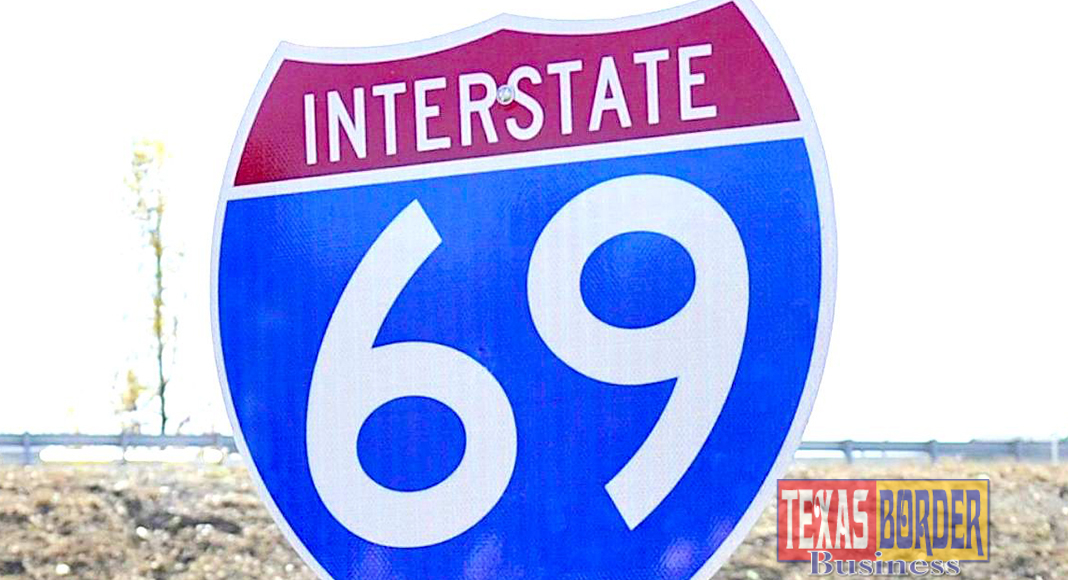
Texas Border Business
WASHINGTON – A dozen representatives of Texas communities and a member of the Texas Transportation Commission were on Capitol Hill this week urging federal officials to fund Interstate 69 projects and improve the project development process.
Members of the Alliance for I-69 Texas asked that Congress quickly provide new funding for I-69 projects from the $20 billion dedicated for infrastructure in the two-year budget agreement approved by Congress in February.
Meeting with members of the I-69 Congressional Caucus and other members of Congress, they also stressed that there is a strategic opportunity to advance I-69 in Texas under the infrastructure proposal recently outlined by the Trump Administration and now being developed by Congress.
Alliance Vice-Chairman Gerry Schwebel of IBC Bank Laredo pointed out that the I-69 delegation was in Washington at an opportune time since Congress is just getting underway on figuring out how the final infrastructure initiative will look. He said I-69 is the “poster child” for what the Trump Administration’s initiative is trying to accomplish, particularly with its focus on improvements in rural areas. Approximately 80% of the I-69 route miles in Texas is in rural areas and other I-69 states have similar rural mileage.
Jeff Austin III, one of the five members of the Texas Transportation Commission, again joined the I-69 Alliance delegation. He stressed the importance of Congress allowing all the new highway funding approved overwhelmingly by Texas voters in recent years to count as part of the state’s match to new federal infrastructure funding.
Alliance members also asked for full funding of the federal Highway Trust Fund, for I-69 to be included in the National Freight Network and for several provisions that would expedite funding to continue progress on I-69 in Texas which reaches from Texarkana to Laredo and the Lower Rio Grande Valley. They also urged speedup of project development time, pointing out that work on I-69 has already been underway for a quarter of a century.
Senator John Cornyn of Texas, the Senate Majority Whip, told the group that he is committed to full funding of the Highway Trust Fund, something he sees as a personal challenge. He said a federal increase in the gasoline tax is a “nonstarter,” but that states may consider that approach. He also mentioned Private Activity Bonds, Tax Increment Finance Authorities and said that he is working with the IRS searching for new ideas for revenue to flow into the Highway Trust Fund which is projected to become insolvent in 2020.
The Alliance for I-69 Texas delegation led a larger group from the eight states along the national I-69 route. Texas, Michigan, Indiana, Kentucky, Tennessee, Mississippi, Arkansas and Louisiana were all represented. Participants provided a state-by-stage progress update and participated in join meetings to underscore the national importance of I-69.
Freight movement, trade and NAFTA negotiations were the primary topics at a dinner hosted by the Alliance which included representatives of Canada and Mexico. Guillermo Malpica Soto, head of the trade and NAFTA office in the Mexican Embassy, reported that there was positive movement in the talks and that consensus had been found on about half of the agreement. He mentioned that the transportation portion of the agreement was still under discussion but was very close to completion with attention being paid to lowering truck congestion and improved, compatible technology for tolling and inspection on both sides of the border.
Colin Bird, Minister-Counselor at the Embassy of Canada, noted that North America is the engine for economic growth in the world and that no countries are more supportive of American economic success than are Canada and Mexico. “The goal is about reducing red tape and keeping manufacturing in North America,” he said. All three countries could be doing a better job of reporting on the success of NAFTA, he said.
Interstate 69 in Texas is being developed as a series of incremental upgrades to existing highways following US 59 from Texarkana to Houston and south to Victoria. In South Texas there are three branches of the I-69 System including US 59 leading to Laredo, US 281 south to McAllen, and US 77 from Victoria to Corpus Christi and on to Brownsville. A total of 161 miles in Texas have been signed as I-69 and another 47 miles has been added as Interstate 2 which connects I-69E and I69C in the Rio Grande Valley. Another 99 miles have bee completed to or are under construction to meet Interstate standards.













